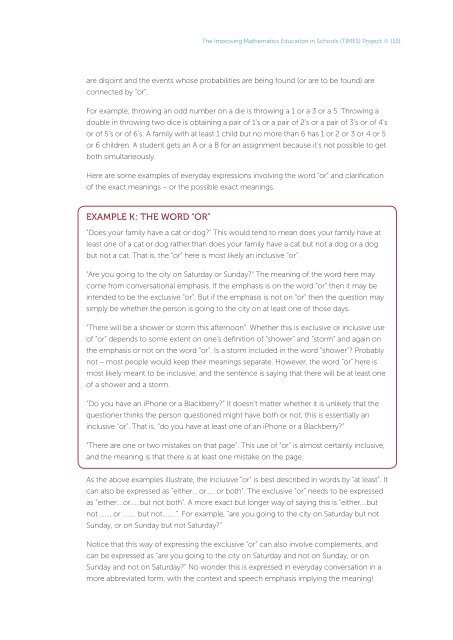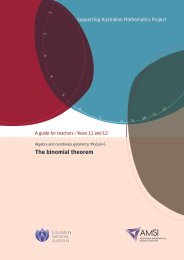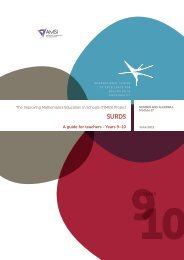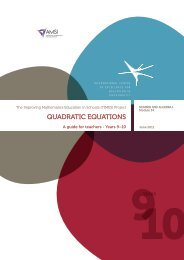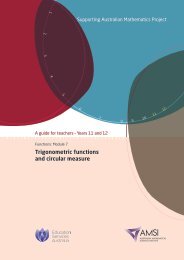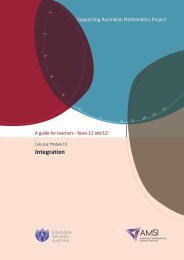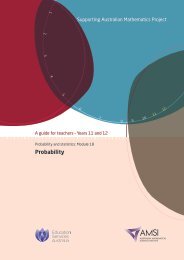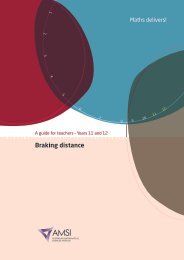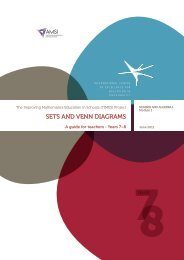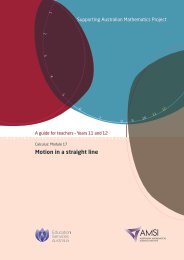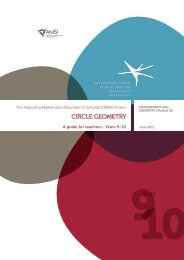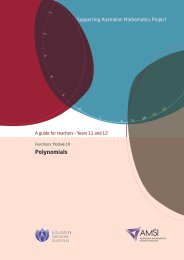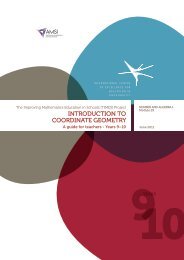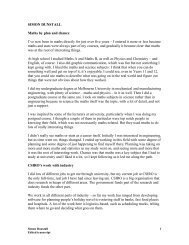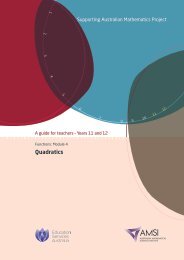PDF Version of module - the Australian Mathematical Sciences ...
PDF Version of module - the Australian Mathematical Sciences ...
PDF Version of module - the Australian Mathematical Sciences ...
You also want an ePaper? Increase the reach of your titles
YUMPU automatically turns print PDFs into web optimized ePapers that Google loves.
The Improving Ma<strong>the</strong>matics Education in Schools (TIMES) Project{13}are disjoint and <strong>the</strong> events whose probabilities are being found (or are to be found) areconnected by “or”.For example, throwing an odd number on a die is throwing a 1 or a 3 or a 5. Throwing adouble in throwing two dice is obtaining a pair <strong>of</strong> 1’s or a pair <strong>of</strong> 2’s or a pair <strong>of</strong> 3’s or <strong>of</strong> 4’sor <strong>of</strong> 5’s or <strong>of</strong> 6’s. A family with at least 1 child but no more than 6 has 1 or 2 or 3 or 4 or 5or 6 children. A student gets an A or a B for an assignment because it’s not possible to getboth simultaneously.Here are some examples <strong>of</strong> everyday expressions involving <strong>the</strong> word “or” and clarification<strong>of</strong> <strong>the</strong> exact meanings – or <strong>the</strong> possible exact meanings.EXAMPLE K: THE WORD “OR”“Does your family have a cat or dog?” This would tend to mean does your family have atleast one <strong>of</strong> a cat or dog ra<strong>the</strong>r than does your family have a cat but not a dog or a dogbut not a cat. That is, <strong>the</strong> “or” here is most likely an inclusive “or”.“Are you going to <strong>the</strong> city on Saturday or Sunday?” The meaning <strong>of</strong> <strong>the</strong> word here maycome from conversational emphasis. If <strong>the</strong> emphasis is on <strong>the</strong> word “or” <strong>the</strong>n it may beintended to be <strong>the</strong> exclusive “or”. But if <strong>the</strong> emphasis is not on “or” <strong>the</strong>n <strong>the</strong> question maysimply be whe<strong>the</strong>r <strong>the</strong> person is going to <strong>the</strong> city on at least one <strong>of</strong> those days.“There will be a shower or storm this afternoon”. Whe<strong>the</strong>r this is exclusive or inclusive use<strong>of</strong> “or” depends to some extent on one’s definition <strong>of</strong> “shower” and “storm” and again on<strong>the</strong> emphasis or not on <strong>the</strong> word “or”. Is a storm included in <strong>the</strong> word “shower”? Probablynot – most people would keep <strong>the</strong>ir meanings separate. However, <strong>the</strong> word “or” here ismost likely meant to be inclusive, and <strong>the</strong> sentence is saying that <strong>the</strong>re will be at least one<strong>of</strong> a shower and a storm.“Do you have an iPhone or a Blackberry?” It doesn’t matter whe<strong>the</strong>r it is unlikely that <strong>the</strong>questioner thinks <strong>the</strong> person questioned might have both or not; this is essentially aninclusive “or”. That is, “do you have at least one <strong>of</strong> an iPhone or a Blackberry?”“There are one or two mistakes on that page”. This use <strong>of</strong> “or” is almost certainly inclusive,and <strong>the</strong> meaning is that <strong>the</strong>re is at least one mistake on <strong>the</strong> page.As <strong>the</strong> above examples illustrate, <strong>the</strong> inclusive “or” is best described in words by “at least”. Itcan also be expressed as “ei<strong>the</strong>r… or….. or both”. The exclusive “or” needs to be expressedas “ei<strong>the</strong>r….or……but not both”. A more exact but longer way <strong>of</strong> saying this is “ei<strong>the</strong>r….butnot ……, or …….. but not……..”. For example, “are you going to <strong>the</strong> city on Saturday but notSunday, or on Sunday but not Saturday?”Notice that this way <strong>of</strong> expressing <strong>the</strong> exclusive “or” can also involve complements, andcan be expressed as “are you going to <strong>the</strong> city on Saturday and not on Sunday, or onSunday and not on Saturday?” No wonder this is expressed in everyday conversation in amore abbreviated form, with <strong>the</strong> context and speech emphasis implying <strong>the</strong> meaning!


